|
|
|
Sort Order |
|
|
|
Items / Page
|
|
|
|
|
|
|
| Srl | Item |
| 1 |
ID:
105922
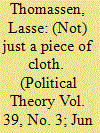

|
|
|
|
|
| Publication |
2011.
|
| Summary/Abstract |
To understand the politics of recognition, one must conceive of it as a politics of representation. Like representation, recognition proceeds at once in a constative and a performative mode, whereby they bring into being what is simultaneously represented or recognized. This structure has paradoxical implications. The politics of recognition is also a politics of representation in the sense that it always involves questions such as, Which representations are recognized? Whose representations are they? The reverse is also true: the politics of representation involves recognition because representatives and representations must be recognized in order to gain authority. In short, we can examine recognition as representation, and there is no recognition without representation, and vice versa. This is demonstrated through a reading of a recent British legal case, Begum, where the issue at stake concerned which representation of Islam should form the basis for the recognition of Islam in the school uniform policy.
|
|
|
|
|
|
|
|
|
|
|
|
|
|
|
|
| 2 |
ID:
151100


|
|
|
|
|
| Summary/Abstract |
Protective policies are essential for individual development and group mobility.
Positive discriminatory efforts seek to reduce group inequalities and to rectify
the consequences of group discrimination. Reservations in the fields of politics,
education and employment aimed at protecting tribal culture and tradition have
achieved strikingly little. Protection of land and life support system has been
poorly implemented. There have been no marked improvements in their social
conditions. Planned intervention has not improved the occupational and educational
levels of tribals. Non-tribals do not treat them equally. Apart from developing
entrepreneurship, follow-up action in providing developmental benefits to
tribals should be made. The single-stroke formula of providing loans and facilities
is unsuited to the development needs of the area. Social capital formation
is needed to ensure justice, or to provide socio-economic justice, which was
traditionally present in the tribal economy and society.
|
|
|
|
|
|
|
|
|
|
|
|
|
|
|
|
| 3 |
ID:
159906
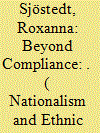

|
|
|
|
|
| Summary/Abstract |
Implementation of minority rights norms is an important step for integration. The ultimate aim of norm diffusion is internalization, that is, when a norm is being taken for granted. This article seeks to develop an understanding of socialization beyond formal compliance and suggests that material and ideational structures at both the elite and societal levels mutually reinforce one another. The framework is applied to the case of the integration of the Russian minority in Estonia, 1991–2016. The concepts of recognition and solidarity help to theorize and explain this socialization process and the constraints of both materialist and identity dimensions.
|
|
|
|
|
|
|
|
|
|
|
|
|
|
|
|
| 4 |
ID:
144298
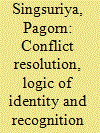

|
|
|
|
|
| Summary/Abstract |
This article analyzes various presuppositions behind the principle of absolute openness, which the philosophers of difference hold as the general principle of conflict resolution. Close attention is paid to the issue of identity. To prevent and resolve conflicts, these philosophers propose that others should be recognized by letting them be themselves. In agreement with works on conflict resolution by scholars from other disciplines such as cognitive and social psychology, sociology, anthropology and international relations, these philosophers see the process of identification as critical to understanding antagonism. They analyze this process using the logic of identity, which leads to the principle of absolute openness. It is shown through Paul Ricoeur's philosophy that the presuppositions underlying their understanding of the logic of identity are problematic. Ricoeur's idea of recognition through narrative is then explored and suggestions of how it may help resolve identity conflicts are discussed.
|
|
|
|
|
|
|
|
|
|
|
|
|
|
|
|
| 5 |
ID:
151175
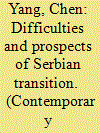

|
|
|
| 6 |
ID:
159780
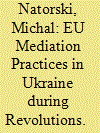

|
|
|
|
|
| Summary/Abstract |
This article compares two different experiences of EU engagement in mediation in Ukraine: the Orange Revolution in 2004 and the Euromaidan crisis in 2013–2014. This comparison reflects two different outcomes of EU mediation practices under similar circumstances of political conflict between domestic political actors. The changing degree of collective EU authority recognized by other actors is the main driver behind varying EU mediation practices and outcomes. Authority conferred on the EU as a collective actor represents the legitimacy of its power, resources and competence to conduct mediation. However, such authority is always circumscribed by crisis-specific circumstances and volatile configurations of forces. Therefore, differing degrees of authority explain shifts in the effectiveness of EU mediation. To capture the authority of EU mediators in specific crisis situations, this article employs and interprets firsthand accounts of the experiences of actors directly involved in mediation.
|
|
|
|
|
|
|
|
|
|
|
|
|
|
|
|
| 7 |
ID:
114811
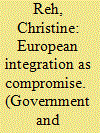

|
|
|
|
|
| Publication |
2012.
|
| Summary/Abstract |
The role of compromise in EU politics has been widely recognized by scholars and practitioners alike. At the same time, the systematic conceptual, analytical and normative study of compromise has remained an exception. This is surprising, given that the study of compromise can be linked to three broader questions at the heart of integration: (1) How does the EU accommodate diversity? (2) What makes supranational rule normatively justifiable? (3) Who or what defines the limits of cooperation? Against this backdrop, this article sheds light on the concept of compromise, on the role of compromise in legitimizing supranational governance and on the limits to compromise in the European polity. I argue that the EU - a divided, multilevel and functionally restricted polity - is highly dependent on the legitimizing force of 'inclusive compromise', which is characterized by the recognition of difference. This is true for horizontal or micro-level relations between political actors (where compromise works through concessions as well as justification, perspective-taking and empathic concern in a process of 'procedural accommodation'), and for vertical or macro-level relations between systems of governance (where compromise works through 'constitutional compatibility'). Given the legitimizing force of inclusive compromise, I subsequently identify the limits to such agreements and, thus, to supranational cooperation; I argue that these limits are issue specific and depend on where the costs of cooperation are borne. The article concludes by outlining routes for follow-up empirical research.
|
|
|
|
|
|
|
|
|
|
|
|
|
|
|
|
| 8 |
ID:
180226
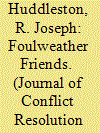

|
|
|
|
|
| Summary/Abstract |
This paper investigates how violence in self-determination conflicts influences bilateral foreign policy. I argue that a general preference for international stability causes third parties to support self-determination groups when violence reaches high levels, when they gain territorial control, and when major powers officially recognize. In these conditions, third parties perceive a stable new status quo to be nigh: unrecognized statehood. Ongoing instability encourages foreign policy that encourages the development of the de facto state, even when third parties have no intention of recognizing them as states. Importantly, I also show that targeting civilians erodes third-party support of the perpetrating side. I demonstrate these relationships using a latent variable model of international sovereignty of aspiring states, built on bilateral military, diplomatic, and economic exchange data. My model and tests provide new insight into how aspiring state actors become increasingly eligible for recognition through the tacit support of third-party states.
|
|
|
|
|
|
|
|
|
|
|
|
|
|
|
|
| 9 |
ID:
073754
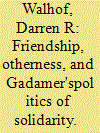

|
|
|
|
|
| Publication |
2006.
|
| Summary/Abstract |
This article makes the political dimension of Gadamer's thought more explicit by examining the interplay of three concepts in his work: solidarity, friendship, and the other. Focusing primarily on certain post-Truth and Method writings, I argue that Gadamer's conception of solidarity has to do with historically contingent manifestations of bonds that reflect a civic life together of reciprocal co-perception. These bonds go beyond conscious recognition of observable similarities and differences and emerge from encounters among those who are, and remain, in important ways other to each other. I make this case through an analysis of Gadamer's phenomenology of friendship and the crucial role of otherness in his accounts of both understanding and friendship. I suggest that Gadamer's political thought gives us a way of conceptualizing solidarity and otherness without making the other same or leaving the other completely other.
|
|
|
|
|
|
|
|
|
|
|
|
|
|
|
|
| 10 |
ID:
137144
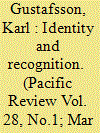

|
|
|
|
|
| Summary/Abstract |
In the 1990s, Japanese views of China were relatively positive. In the 2000s, however, views of China have deteriorated markedly and China has increasingly come to be seen as ‘anti-Japanese’. How can these developments, which took place despite increased economic interdependence, be understood? One seemingly obvious explanation is the occurrence of ‘anti-Japanese’ incidents in China since the mid-2000s. I suggest that these incidents per se do not fully explain the puzzle. Protests against other countries occasionally occur and may influence public opinion. Nonetheless, the interpretation of such events arguably determines their significance. Demonstrations may be seen as legitimate or spontaneous. If understood as denying recognition of an actor's self-identity, the causes of such incidents are likely to have considerably deeper and more severe consequences than what would otherwise be the case. Through an analysis of Japanese parliamentary debates and newspaper editorials, the paper demonstrates that the Chinese government has come to be seen as denying Japan's self-identity as a peaceful state that has provided China with substantial amounts of official development aid (ODA) during the post-war era. This is mainly because China teaches patriotic education, which is viewed as the root cause of ‘anti-Japanese’ incidents. China, then, is not regarded as ‘anti-Japanese’ merely because of protests against Japan and attacks on Japanese material interests but for denying a key component of Japan's self-image. Moreover, the analysis shows that explicit Chinese statements recognising Japan's self-identity have been highly praised in Japan. The article concludes that if China recognises Japan's self-understanding of its identity as peaceful, Japan is more likely to stick to this identity and act accordingly whereas Chinese denials of it might empower Japanese actors who seek to move away from this identity and ‘normalise’ Japan, for example, by revising the pacifist Article Nine of the Japanese constitution.
|
|
|
|
|
|
|
|
|
|
|
|
|
|
|
|
| 11 |
ID:
179526
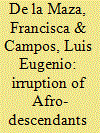

|
|
|
|
|
| Summary/Abstract |
This paper analyses the irruption of Afro-descendants in the sphere of local and national public policies as aresult of their demand for political recognition. Starting in 2000, an Afro-descendant movement developed, positioning itself locally and nationally and obtaining political recognition in 2019 under Law N° 21.151. Incorporating a‘new diversity’ in the design and implementation of public policies as distinct from the indigenous policies that had been implemented for more than 25 years. The paper analyses different levels of state action, relations with other diversities in the implementation of targeted policies (particularly indigenous policies) and the process of Afro-descendant recognition itself. This case shows the difficulties in broadening the social and state vision of cultural diversity and how these are reflected in disputes about the legitimacy of being the ‘original’ peoples as well as for spaces of power and state resources.
|
|
|
|
|
|
|
|
|
|
|
|
|
|
|
|
| 12 |
ID:
140450
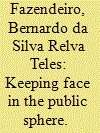

|
|
|
|
|
| Summary/Abstract |
The manner in which President Karimov's roles were recognized in the global arena affected how Uzbekistan's international relations developed – a perspective that highlights both the form and the content of bilateral relationships. While mutual interests are crucial to beginning a relationship, it is also important to understand how those relations were recognized in public and dealt with in private. If partners managed to recognize Karimov's agenda publicly, or at least act with discretion, this tended to create an atmosphere favouring cooperation. As such, recognition and discretion reveal much about Karimov's concerns with international equality and self-reliance, pointing to the reasons why Uzbekistan's relations fluctuated more with some actors than others. The United States and Germany are ideal examples of that ambivalent situation: Washington often cooperated with Uzbekistan on security matters, but then saw its military personnel excluded from Qarshi-Qanabad after the 2005 Andijan crisis; whereas Berlin witnessed little change in its relationship with Uzbekistan and continued to lease a base in Termez after 2005. This difference in outcomes can be explained in part by a dynamic of recognition and discretion.
|
|
|
|
|
|
|
|
|
|
|
|
|
|
|
|
| 13 |
ID:
144807
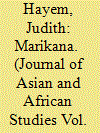

|
|
|
|
|
| Summary/Abstract |
This article analyses some of the reasons for the violent repression of the miners’ strike in Marikana, South Africa, in which 34 people died on 16 August 2012. It explores the economic and productive context which led the Rock Drill Operators to demand a wage increase outside the usual wage-bargaining structures. It goes on to examine the strikers’ subjectivity and the principles of their strike. Because the strike was organised independently of the main union, the National Union of Mineworkers, by miners demanding direct talks with their employer, as a sign of recognition, it illustrated a crisis of representation and embodied an alternative politics. The author argues that the African National Congress government was faced with a challenge to its instituted forms of political representation and, as a result, ordered the police to fire on the demonstrators.
|
|
|
|
|
|
|
|
|
|
|
|
|
|
|
|
| 14 |
ID:
166889
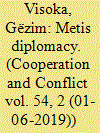

|
|
|
|
|
| Summary/Abstract |
How do emerging states obtain international recognition and secure membership of international organizations in contemporary world politics? Using the concept of ‘metis’, this article explores the role of everyday prudent and situated discourses, diplomatic performances and entanglements in the enactment of sovereign statehood and the overcoming of external contestation. To this end, it describes Kosovo’s diplomatic approach to becoming a sovereign state by obtaining international recognition and securing membership of international organizations. Drawing on institutional ethnographic research and first-hand observations, the article argues that Kosovo’s success in consolidating its sovereign statehood has been the situational assemblage of multiple discourses, practiced through a broad variety of performative actions and shaped by a complex entanglement with global assemblages of norms, actors, relations and events. Accordingly, this study contributes to the conceptualization of the everyday in diplomatic practice by offering an account of how micro-practices feed into macro-practices in world politics.
|
|
|
|
|
|
|
|
|
|
|
|
|
|
|
|
| 15 |
ID:
187308
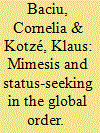

|
|
|
|
|
| Summary/Abstract |
An increasing strand of literature has been studying the dynamics of contestation of the liberal order. Holding that order emergence commences with rhetoric and narratives, this article takes stock of the BRICS summit diplomacy and contestation practices. It pursues a two-level argument. Applying BRICS as a historical case study, the article first reveals how BRICS engages in mimetic performances, re-producing parts of the global order, while simultaneously seeking a re-configuration of the current international system. Second, our analysis shows that through thin and aspiring thick recognition, BRICS countries move toward an enhanced role and status, striving for a better position in the global order. Empirically, to unpack our argument, we analyze BRICS summit diplomacy and rhetoric by unfolding the outcome declarations in the period 2009–2020, as well as BRICS performative practices.
|
|
|
|
|
|
|
|
|
|
|
|
|
|
|
|
| 16 |
ID:
138938
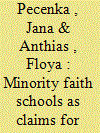

|
|
|
|
|
| Summary/Abstract |
This paper presents two cases of minority faith school claim-making in England and considers what supporters of the claims say about their hopes and intentions for the schools. The paper redresses a gap in the literature on minority faith school claims and on minority claim-making more generally, which has tended to present minority claims as expressions of specific religious group identities, whilst it has had little to say about what motivates individual claimants to mobilise in the name of such identities. From an in-depth study of individual positions in favour of the two faith schools, it is concluded that depicting these claims as primarily claims for identity recognition fails to attend to the multilayered ways in which these claimants discuss their orientations to the claims and the root causes they identify for making them.
|
|
|
|
|
|
|
|
|
|
|
|
|
|
|
|
| 17 |
ID:
178155
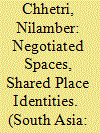

|
|
|
|
|
| Summary/Abstract |
Succeeding waves of mobilisation for the separate state of Gorkhaland has left an indelible imprint on the cultural, political and urban landscape of the Darjeeling Hills. Based on empirical research, this paper tries to explore the intricate relationship between ethnicity, place and politics of belonging in the Himalayan town of Kalimpong. It specifically tries to locate the interface between political events and the transformation of the urban landscape by taking into consideration the growth of roadside settlements. While noting the specific contours of these settlements, their culture and their liminal condition, the paper tries to address the issues pertaining to place-making and identity formation in the Himalayan region.
|
|
|
|
|
|
|
|
|
|
|
|
|
|
|
|
| 18 |
ID:
158137
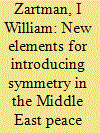

|
|
|
|
|
| Summary/Abstract |
This issue contains an examination of Palestinian-Israeli negotiations with an effort to break through the deadlock strategically. It analyzes the past record of failure and addresses the basic problem of asymmetry. Despite the solutions that have been advanced for all the specific issues, it is the forward-looking matter of trust that is the impediment to productive negotiations. The declaration of a Palestinian state and its recognition by the international community are now the basic elements necessary to break the asymmetry of the parties. A second element – allegedly favored by the Trump administration – is to reduce a symmetry by enlarging the playing field to include surrounding states, as proposed in the 2002 Arab Peace Initiative.
|
|
|
|
|
|
|
|
|
|
|
|
|
|
|
|
| 19 |
ID:
141717
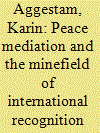

|
|
|
|
|
| Summary/Abstract |
This article analyzes the intricate dynamics between international mediation and the quest for recognition in protracted conflict. The overarching aim is two-fold: to analyze how the struggle for recognition relates to protracted conflict, and why, when and in what ways recognition poses a barrier to efficient peace diplomacy and mediation. The article explores how preferences and interests are infused with identity politics and claims for recognition. It advances three inter-related dimensions of recognition: ontological security, dignity and identity. The conceptual discussion utilizes empirical illustrations from the Israeli-Palestinian conflict. Three concluding remarks are made. First, international mediation may be accepted by negotiating parties to achieve international recognition rather than to reach an agreement. Second, due to the problem of recognition the notion of “ending conflict” can backfire in the mediation process. Third, mediators should focus on mutual, but thin recognition towards greater acknowledgement of the untenable and vulnerable positions the parties hold in conflict.
|
|
|
|
|
|
|
|
|
|
|
|
|
|
|
|
| 20 |
ID:
102952
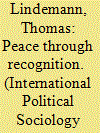

|
|
|
|
|
|
|
|